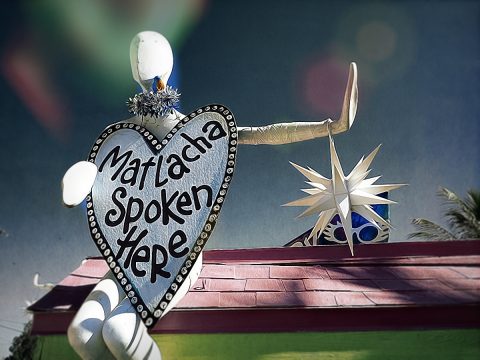We all know the traditional story of Jonah, who was swallowed by a whale and then spat back up. The characters in your story, though, don’t leave the belly of the whale. Can you explain how the idea for “Swallowed” came about?
A few years ago, there was a news story circulating about “the loneliest whale in the world.” No one has ever seen this whale, but we’ve been listening to it since 1989. Every year or so, scientists find its unusually high, 52-hertz song traveling through their hydrophones. It’s like a sad love story. Or like an internet relationship where you have the words, the text, but you’re never sure if the person on the other end is the person you imagine them to be. For almost three decades people have been tracking this whale, making up stories about the creature they can’t see.
“Swallowed” was most directly inspired by this real life “loneliest whale,” but I had other whale stories in the back of my mind, less consciously informing my writing. In Old English and Norse, the sea was sometimes referred to as a hron-rād, literally translated as “whale road.” Some early people—for example, the Thule in Alaska—would use the whale’s jawbones as a frame for shelters. The whale has a huge presence in our collective imaginations; it swims through both our stories and our histories.
From the whale being the loneliest in the world to the brothers being alone except for each other, there is a clear theme of isolation in the story. However, the narrator is first-person plural, from the perspectives of the brothers. Is this paradox intentional and what purpose does this choice serve in the story?
It wasn’t intentional at first, though I think the contradiction is what convinced me to keep the first-person plural in later drafts. I’m drawn to the “we” because it gives the illusion of oneness, while acknowledging that there are multiple speakers within the voice. In this story, I wanted to explore how loneliness can exist even as we share an experience, and first-person plural felt like the most effective way to challenge what it means to be truly with someone.
Describe your relationship with flash fiction. What do you believe defines a piece of flash, and what do you believe it offers that other forms of writing don’t?
George Saunders has this wonderful metaphor for a short story that he shares in a Colbert Report interview. He asks you to imagine that you want to tell someone you’re in love with how you feel. There are two scenarios. In the first, you take a train ride with your beloved and have a week to share how you feel (this is a novel). In the second scenario, your beloved is about to get on the train, and you have only three minutes before she disappears forever (this is a short story).
Continuing this metaphor for flash fiction, I think there is a third scenario. Your beloved is already on the train, and the train is pulling out of the station. You find their face watching you through their compartment window. In this scenario, you have only seconds, only a handful of words, to tell them how you feel.
Flash fiction is special because we can see the end from the beginning, and that gives it a sense of urgency that other forms don’t have. I like the challenge of telling a story in a page, the pressure it puts on every syllable.
There is a moment in the story, right after the last break where the narrator invents similes, each one a paragraph of its own. This moment, along with the first paragraph of the story bring forth a poetic notion. Do you feel the same way about it? Do you often find that lyricism has a large presence in all of your fiction?
For me, lyricism in prose means placing a priority on the sounds words make and the rhythm they create together. I do think lyricism has a large presence in my fiction, because before I loved stories, I loved words—their shapes, their layered meanings, the way adding or taking away a single letter could change a word’s sound and definition.
In this story, lyricism becomes important to the brothers, because to stay sane they need to look beyond their surface-level reality and find meaning in their experience. Or if not meaning, they at least need to find play.
Since most readers and other writers want to know, I must ask if you have any writing secrets or superstitions, such as preferring solidarity at 3 a.m. with a cup of coffee and your lucky Snuggie, and what other authors have been an inspiration to you?
I write in the evening, with a hot drink, sitting at my desk. I usually have a song or album I listen to on repeat to get myself into the right mood for the story. For “Swallowed,” I’m pretty sure I was listening to the soundtrack for the video game Child of Light.
Some of my earliest inspirations were Anthony Doerr, Laura van den Berg, George Saunders, and Aimee Bender—writers who observe life with precision, and often at a slant. Lately, though, I’ve been most inspired by the storytelling techniques of some really beautiful indie video games. Life is Strange, Child of Light, Firewatch, and all of the Telltale games are really lovely, just to name a few.



 The core workshop of SmokeLong Fitness is all in writing, so you can take part from anywhere at anytime. We are excited about creating a supportive, consistent and structured environment for flash writers to work on their craft in a community. We are thrilled and proud to say that our workshop participants have won, placed, or been listed in every major flash competition. Community works.
The core workshop of SmokeLong Fitness is all in writing, so you can take part from anywhere at anytime. We are excited about creating a supportive, consistent and structured environment for flash writers to work on their craft in a community. We are thrilled and proud to say that our workshop participants have won, placed, or been listed in every major flash competition. Community works.